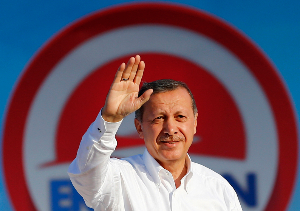Turkey's Presidential Election: The Clouds on Erdogan's Horizon
By Gareth Jenkins (vol. 7, no. 14 of the Turkey Analyst)
Despite his convincing victory in the presidential elections on August 10, 2014, there appears little prospect of Prime Minister Recep Tayyip Erdoğan being able to replace Turkey’s parliamentary system with a presidential one and ruling the country singlehandedly for two successive five-year terms.

What the Columnists Say
The nomination of Ekmeleddin İhsanoğlu as the joint candidate of the two opposition parties CHP and MHP in the upcoming presidential election has set off a lively debate among pro-CHP, secularist commentators.
A Divisive Campaign in a Polarized Turkey
By M. K. Kaya (vol. 4, no. 12 of the Turkey Analyst)
The June 12 general election was historic as it was the first general election in Turkey over which the shadow of the military and the other institutions of tutelage did not fall. Yet the ruling party’s tactics ensured that the election campaign still took place in an environment whose atmosphere was all but democratic. The elections underlined Turkey’s traditional split between a rightist majority and a leftist minority; it also showed that the AKP and the Kurdish BDP – the election’s main winner – both benefited from the polarized electoral environment; further, the main opposition CHP’s impossibly eclectic crop of candidates had too little of a common denominator to challenge the AKP. It will now be up to the new parliament to put the divisive campaign behind it and achieve a new constitution through compromise. Whether that is at all likely nevertheless remains doubtful.
Above the Threshold, Below the Belt: the Video Campaign Against the MHP
By Gareth H. Jenkins (vol. 4, no. 11 of the Turkey Analyst)
On May 21, 2011, six members of the Turkish ultranationalist Nationalist Action Party (MHP) resigned from the party’s National Executive Committee after an internet website began broadcasting secretly-recorded videos of them engaging in extramarital sexual relations. Over the previous month, four other leading members of the MHP had been forced to resign after similar secretly-recorded videos were posted on the same internet website. The identity of those responsible for recording and broadcasting the videos currently remains unclear. However, opposition parties have accused supporters of the ruling Justice and Development Party (AKP), whose campaign for the June 12 general election has been largely based on trying to prevent the MHP from gaining enough votes to cross the 10 percent threshold for representation in parliament.
Could the MHP's Turkish-Islamic Synthesis Challenge the AKP's Hold on Power?
By M. K. Kaya and Halil M. Karaveli (vol. 2, no. 3 of the Turkey Analyst)
The upcoming local elections in Turkey will be a test of whether the ruling Justice and development party (AKP) can be successfully challenged by the opposition; indeed, of whether there is any viable opposition left to speak of. As they try to navigate in a political landscape increasingly dominated by Islamic conservatism, both the leftist Republican People’s Party (CHP) and the right-wing Nationalist Action Party, MHP, are seeking ways to reinvent themselves, hoping to appeal to a broader electorate. The efforts are beset by ideological contradictions and ambiguities, but MHP is best placed to challenge the AKP.



